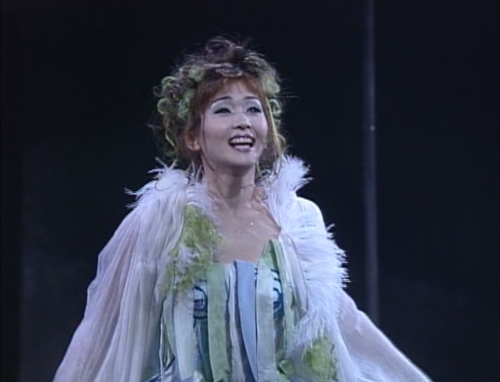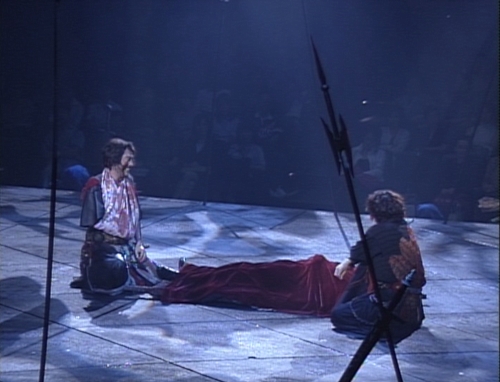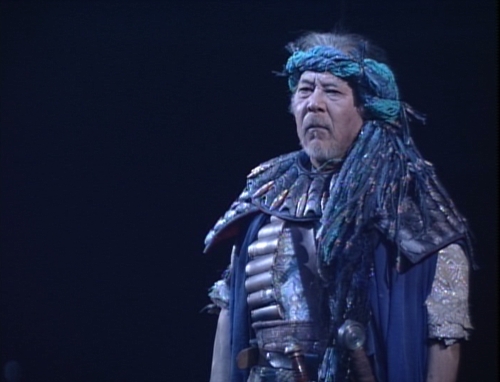
Following my review of Yukio Ninagawa’s The Greeks, this post contains screencaps from The War, which includes the prologue, “Iphigenia in Aulis,” “Achilles,” and “The Trojan Women.” Read on for forty-three screencaps!
Prologue

The Greeks begins with small groups of actresses appearing in modern dress in the aisles, each group performing the beginning of the prologue. Some of the actresses who appear as members of the chorus in the prologue will later play major characters – Thetis and Clytemnestra are in the screencap above. The groups all enter at slightly different times but they recite the same lines. On the DVD you can hear them all talking over each other and I find it a little difficult to follow, but presumably the audience in the theatre would just listen to the group closest to them.

The theatre goes dark and the members of the chorus who were sleeping in boxes on the stage wake up.

The chorus climbs out of their boxes and continues the prologue, which provides the backstory to the war. Above them you can see the pendulum that descends at the beginning and end of each segment, ticking loudly as if it’s moving time forward. You can also maybe see in this picture that the stage is a rectangle with the audience on either side.

The chorus reenacting the Judgement of Paris. The actresses playing Paris and Aphrodite here will later show up as Helen and Briseis.
Iphigenia in Aulis (Euripides)

The prologue leads directly into “Iphigenia in Aulis.” A frightened Agamemnon (Mikijiro Hira) appears with the letter he’ll try to send to tell Iphigenia not to come. I’m not often a fan of Agamemnon, but I really like Hira’s portrayal.

Agamemnon listening to Menelaus after he intercepts the letter.

The arrival of Iphigenia (Yuko Miyamoto), Clytemnestra (Kayoko Shiraishi), and baby Orestes. There’s a bit of a running joke that Orestes cries at basically everything.
Whenever a character appears for the first time, their name and the actor’s name appear onscreen. This and the title that appears in the corner every time the stage goes dark make me wonder if this recording was created to be shown on television. Luckily, the names are careful not to reveal the identity of anyone who comes onstage in disguise!

Achilles (Seiichi Tanabe) telling Clytemnestra he never agreed to marry her daughter.

Clytemnestra is shocked to hear this. (The flowers in the background come onstage just before, when she insists they start celebrating the wedding.)

Iphigenia, in a yellow wedding dress, dances with the chorus and does an impression of Cassandra.

This and the next two screencaps are from the scene where Clytemnestra tries to persuade Agamemnon not to sacrifice Iphigenia.



Iphigenia uses Orestes to try to persuade her father.

Sometimes the flowers get in the way of the camera in a terrible way, blocking characters’ faces as they deliver lines, but sometimes they make for really pretty shots.

Achilles offers Iphigenia his help.

A resolved Iphigenia.

A member of the chorus helps Iphigenia put on her wedding veil before she leaves the stage.
Achilles (based on Homer’s Iliad)

“Achilles” starts with Thetis (Kaho Minami) running onstage and telling us about her life in the sea and her marriage to Peleus. Minami is the most adorable Thetis I have yet seen and I really love her costume – the light colours and fabrics really contrast with the dark and heavy outfits worn by most of the mortal characters. Her appearances are also always preceded by the ringing of a small bell. This all works together to make her feel a bit more ethereal than everyone else, which I think is really great.

Thetis is suddenly serious when she tells us she knows that Achilles will die.

Agamemnon remembers what he did to Iphigenia while Achilles listens in the background.

Achilles and Odysseus (Takashi Fujiki). The lines in the foreground of these screencaps are spears and swords decorating the sides of the stage. They serve as a visual cue that this play takes place during the war, but I particularly like how, when Achilles wants to charge into battle after Patroclus’s death, he runs over to one of the decorative swords and tries to yank it free.

Tanabe’s acting is a little too stiff for me to love him as Achilles, but he does have some good expressions.

Achilles asking Thetis for help after the argument with Agamemnon.

Skipping ahead a fair bit, here Patroclus puts on Achilles’ armour while Achilles stands silent in the foreground. Patroclus is played by Eiji Yokota, who played Hector in Ninagawa’s 2012 “Troilus and Cressida.” I completely did not recognize him!

Achilles and Patroclus looking out at the battlefield.

Thetis listening to Achilles lament Patroclus’s death.

Agamemnon comes to make peace as Achilles watches over Patroclus’s body.

Thetis, holding Achilles’ new armour, sends the flies away from Patroclus’s body.

Achilles and Thetis say good-bye. Following this, Achilles leaves the stage and Thetis runs around it and then up the aisle shouting his name. I suspect it sounds ridiculous written out like that, but it breaks my heart every time I watch it.

Briseis (Seika Kuze) is in this play, but she only has one short speech, which she delivers to Patroclus’s body. Note that her costume is all blue except for the one red thread at her neck. A way to show that she’s a Trojan ally who has been claimed by the Greeks?

The arrival of Priam (Kazuhisa Seshimo). I didn’t screencap it because the dummy they used for Hector’s body gives me nightmares, but there’s a great moment soon after this where Priam asks to see Hector’s body and Achilles, without any warning, silently and quickly tears the sheet off it, revealing the gruesome sight all at once. I think you could debate whether or not this is in character for Achilles at this moment, but as a shocking visual I love it.

Priam and Achilles eat together and Priam tells Achilles how beautiful Troy is inside the walls. “Achilles” ends with Priam going to bed and Achilles asking Briseis to join him in his.
The Trojan Women (Euripides)

I don’t have much to show you from “The Trojan Women,” mainly because I find watching it (in any production) to be such a draining experience that I didn’t want to prolong it any more than necessary. Although Agamemnon doesn’t appear in Euripides’ original, here he starts the play, telling us how Troy was taken. In the screencap above, he can hardly believe it finally happened. I suspect he was inserted because otherwise every character in the play would be new to the audience. (Every character except for the messenger Talthybius, that is – his role is expanded so that he appears in each of the first five plays!) I have no problem with Agamemnon being here but I don’t particularly enjoy watching his part; in his manhandling of Cassandra, the play comes as close as it ever does to portraying a rape onstage. As if “The Trojan Women” weren’t difficult enough to watch already!

Misako Watanabe as Hecuba.

And now for another installment of the amazing facial expressions of Cassandra, here played by Tomoko Nakajima. I had previously seen Nakajima as Electra in Ninagawa’s 2006 “Orestes” and was pretty happy to see her here!

Cassandra wears strips of paper with red writing on them in her hair and on her priestess robes. A Japanese friend of mine helped me in identifying them as ofuda, and told me that she thinks a character who wears them is trying to ward off bad spirits. This is definitely my favourite of the Japanese influences in The Greeks; the ofuda have a clear connection with the character and also I think they make her costume more visually interesting.

The red ropes you might be able to see in the background and foreground of these pictures are all attached to members of the chorus (and Polyxena) who are lying tied up onstage. As if “The Trojan Women” weren’t difficult enough to watch already!


Andromache (Rei Asami) with Astyanax behind her. Asami makes for a slightly older Andromache than I’m used to seeing but I very quickly fell in love with her performance. She brings a kind of silent strength to the role that really works.

Helen (Mira Anju) is all smiles except when Hecuba is speaking against her.

Talthybius (Takahisa Nishikibe) brings Hecuba the body of Astyanax.

The stage turns red and we hear clips from modern day war-related broadcasts as Troy burns.
Other Greeks posts: my review; The Murders screencaps; The Gods screencaps
Leave a comment